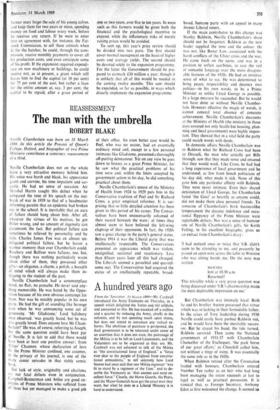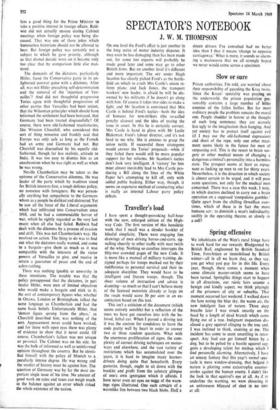The man with the umbrella
REASSESSMENT ROBERT BLAKE
Neville Chamberlain was born on 18 March 1869. In this article the Provost of Queen's College, Oxford, and biographer of two Prime Ministers contributes a centenary reassessment of a third.
Neville Chamberlain does not on the whole leave a very attractive memory behind him. His voice was harsh and bleak, his appearance gaunt and corvine, his tone impatient and sar- castic. He had no sense of occasion. Air Marshal Harris caught this defect when he compared the tone of his speech on the out- break of war in 1939 to that of a headmaster informing parents that an epidemic had broken out in the school. It is inevitable that an aura of failure should hang about him. After all, xhatever the virtues of his motives, he got Hitler wrong, and no amount of ingenuity can circumvent the fact. But political failure can sometimes be relieved by personality and by style. Charles James Fox was an almost un- mitigated political failure, but he leaves a warmer memory than ever Chamberlain could. Rosebery and Balfour were failures, too, but, though there was nothing particularly warm about either of them, they possessed other gifts—an elegance, a charm, a polish, a breadth of mind which will always make them in- triguing to the student of the past.
Neville Chamberlain had a commonplace mind, no flair, no panache. He never said any- thing memorable. He was hated by the Oppo- sition because of his own obvious contempt for them. Nor was he notably popular in his own party. He had the gift of sounding like Scrooge e■en when he was announcing some act of generosity. 'Mr Gladstone,' Lord Salisbury once observed. 'was greatly hated, but he was al.° greatly loved. Does anyone love Mr Cham- berlain?' He was, of course, referring to Joseph, but the same question could have been put of Neville. It Is fair to add that there would have been at least one positive answer: from 'Chips' Channon. whose declaration of love for the Prime Minister confined, one assumes, to the privacy of his journal, is one of the many comic episodes in that richly comic book.
But lack of style, originality and charisma are not fatal defects Iven in conjunction. Campbell-Bannerman and Attlee are good ex- amples of Prime Ministers who suffered from all three but yet managed to make a good job of their office. An even better case would be Peel, who was no orator, had an essentially ordinary mind and, except to a few personal intimates like Gladstone, presented a thoroughly off-putting demeanour. Yet on any view he goes down to history as a great Prime Minister, for he saw what the practical problems of his time were and, within the limits accepted by government action in his day, he did something practical about them.
Neville Chamberlain's tenure of the Ministry of Health from 1924 to 1929 puts him in the Conservative tradition of Peel and Sir Richard Cross, a great empirical reformer. It is sur- prising that so little detailed attention has been given to this period of his career. The Conser- vatives have been unnecessarily ashamed of their record between the wars: at times they almost seem to have believed the left-wing claptrap of their opponents. In fact, the 1920s saw a great change in the party's general status. Before 1914 it was the Liberal party that was intellectually respectable. The Conservatives presented an appearance which was violent, undignified, sectional and reactionary. Less than fifteen years later all this had changed. The Liberals seemed- a parochial and quarrel- some sect. The Conservatives had acquired the status of an intellectually reputable, broad- based, humane party with an appeal to many former Liberal voters.
If the main contributor to this change was Stanley Baldwin, Neville Chamberlain's share should not be forgotten. Baldwin as the new leader supplied the tone and the colour. He was not, like Bonar Law, associated with the harsh conflicts of the Ulster crisis and the war. He came fresh on the scene, and was in a position to soften acerbities, to cast the veil of romantic language over the more disagree- able features of the 1920s. He had an intuitive sense of what to say. He was determined to bring peace, respectability and decency into politics—in his own words, to be a Prime Minister as unlike Lloyd George as possible. In a large measure he succeeded. But he would not have done so without Neville Chamber- lain. However effective the magic of words, it cannot conceal total absence of concrete achievement. Neville Chamberlain's measures at the Ministry of Health (the ministry in those days covered not only health but housing, plan- ning and local government) were highly impor- tant. They showed that in a vital field the party could match words with deeds.
In domestic affairs Neville Chamberlain was to Baldwin what Sir Richard Cross had been to Disraeli, the man who actually got Bills through, saw that they made sense and ensured that they would work. Like Cross, he had had a long experience of local government and he understood, as few front bench politicians of his day did, what made it tick. None of this gave him any particular affinity with Baldwin. They were never intimate. Even their shared detestation of Lloyd George, for Chamberlain hated 'the Goat' as heartily as anyone could, did not make them close personal friends. To someone of Chamberlain's brisk businesslike temperament the dreamy indolence and occa- sional flippancy of the Prime Minister were regrettable defects. Nor was a sense of humour one of Neville Chamberlain's gifts. Sir Keith Felling, in his excellent biography, gives us an extract from Chamberlain's diary : 'I 'had noticed once or twice that S.B. didn't seem to be attending to me, and presently he passed an open note across the table to Winston who was sitting beside me. On the note was written
MATCIIES
lent at 10.30 a.m.
Returned?
This triviality while a very grave question was being discussed under S.B.'s chairmanship made the most deplorable impression on me.'
But Chamberlain was intensely loyal. Both he and his brother Austen possessed that virtue which was so lacking in their formidable father. In the crises of Tory leadership during 1930 Neville could easily have pushed Baldwin out, and he would have been the inevitable succes- sor. But he stayed his hand, the tide turned, Baldwin survived. Then came the National government of 1931-37 with Chamberlain Chancellor of the Exchequer, 'the pack horse of our great affairs,' as Churchill called him, not without a tinge of irony. It was essentially the same role as in the 1920s.
When Baldwin retired after the Coronation loaded with honours, Chamberlain entered Number Ten rather as an heir who had long been managing the estate succeeds at last to legal as well as practical possession. It is ironical that, as Foreign Secretary, Anthony Eden at first welcomed the change. It seemed to
him a good thing for the Prime Minister to take a positive interest in foreign affairs. Bald- win did not actually snooze during Cabinet meetings when foreign policy was being dis- cussed. That was one of those jokes which humourless historians should not be allowed to hear. But foreign policy was certainly not a subject to which he gave priority, although as that dismal decade wore on it became only too clear that by comparison little else mat- tered.
The demands of the dictators, particularly Hitler, faced the Conservative party in its en- lightened postwar guise with a dilemma. After all, was not Hitler preaching self-determination and the removal of the 'injustices of Ver- sailles'? And did not thoughtful progressive Tories agree with thoughtful progressives of other parties that Versailles had been unjust, that the Wilsonian principles which should have informed the settlement had been betrayed, that Germany had been treated disgracefully? Of course, there were old-fashioned reactionaries, like Winston Churchill, who considered this sort of thing nonsense and frankly said that Europe was only safe as long as the French had an army and Germany had not. But Churchill was discredited by his equally old- fashioned, though far less realistic, attitude to India. It was too easy to dismiss him as an anachronism when he was right as well as when he was wrong.
Neville Chamberlain may be taken as the epitome of the Conservative dilemma. He was leader of the party which by tradition stood for British interests first, a tough defence policy, no nonsense with foreigners. He was person- ally anything but sympathetic to the Germans whom as a people he disliked and distrusted. Yet he saw all the force of the Liberal argumentt which had infiltrated into Conservatism since 1918, and he had a commendable horror of war, which he rightly regarded as the very last resort when all else had failed. Baldwin had dealt with the dilemma by a process of evasion and drift. This was not Chamberlain's way. He resolved on action. The thing to do was to find out what the dictators really wanted, and come to a bargain—give them as much as it was compatible with the interests of the victor powers of Versailles to give, and receive in return a guarantee of peace and the end of sabre-rattling.
There was nothing ignoble or unworthy in these intentions. The trouble was that the policy presupposed that the dictators, in par=' ticular Hitler, were men of limited objectives who would make a bargain and stick to it; the sort of contemporary figures who, whether in Ottawa, London or Birmingham, talked the same language as Chamberlain and had the same basic beliefs. Unfortunately Hitler, that 'demon figure sprung from the abyss,' as Clurchill described him, was nothing of the sort. Appeasement never could have worked, and for those with open eyes there was plenty of evidence to show that it never could. Of course, Chamberlain's failure was not unique or personal. The Cabinet was on his side. So was the bulk of informed as well as uninformed
opinion throughout the country. But he identi- fied himself with the policy of Munich to a
peculiarly intense degree. He was wrong and the verdict of history must be against him. The question of Germany was by far the most im- portant single issue of his time. No amount of good work on rates and taxes can weigh much in the balance against an error which risked the whole existence of the nation.



































 Previous page
Previous page